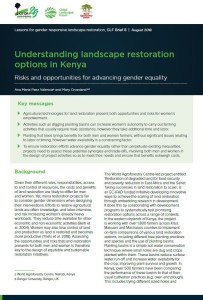Resource information
Given their different roles, responsibilities, access to and control of resources, the costs and benefits of land restoration are likely to differ for men and women. Yet, many restoration projects fail to consider gender dimensions when designing their interventions. Efforts to restore agricultural lands are often knowledge- and labor-intensive, and risk increasing women’s already heavy workloads.
In its project on ‘Restoration of degraded land for food security and poverty reduction in East Africa and the Sahel the World Agroforestry Centre tests promising restoration options across a range of contexts. Using methods adapted from the INGENAES toolkit ‘Assessing how agricultural technologies can change gender dynamics and food security outcomes’ this brief explores the risks and opportunities that planting basins and tree planting present for advancing gender equality in this effort. It focuses on how men and women control and benefit from the interventions, and the differentiated impacts on their time and labor.


